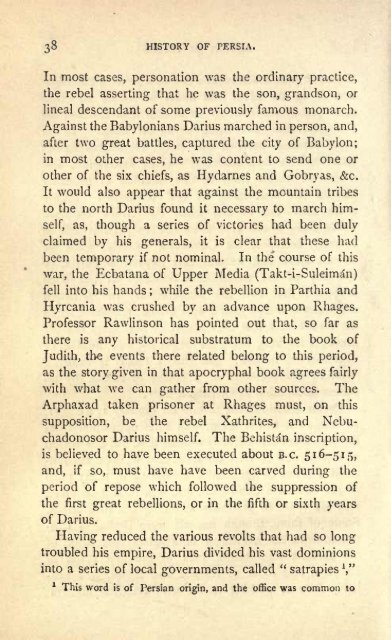Persia from the Earliest Period to the Arab
Persia from the Earliest Period to the Arab
Persia from the Earliest Period to the Arab
You also want an ePaper? Increase the reach of your titles
YUMPU automatically turns print PDFs into web optimized ePapers that Google loves.
3 HISTORY OF PERSIA.<br />
In most cases, personation was <strong>the</strong> ordinary practice,<br />
<strong>the</strong> rebel asserting that he was <strong>the</strong> son, grandson, or<br />
lineal descendant of some previously famous monarch.<br />
Against <strong>the</strong> Babylonians Darius marched in person, and,<br />
after two great battles, captured <strong>the</strong> city of Babylon;<br />
in most o<strong>the</strong>r cases, he was content <strong>to</strong> send one or<br />
o<strong>the</strong>r of <strong>the</strong> six chiefs, as Hydarnes and Gobryas, &c.<br />
It would also appear that against <strong>the</strong> mountain tribes<br />
<strong>to</strong> <strong>the</strong> north Darius found it necessary <strong>to</strong> march him-<br />
self, as, though a series of vic<strong>to</strong>ries had been duly<br />
claimed by his generals, it is clear that <strong>the</strong>se had<br />
been temporary if not nominal. In <strong>the</strong> course of this<br />
war, <strong>the</strong> Ecbatana of Upper Media (Takt-i-Suleimdn)<br />
fell in<strong>to</strong> his hands ; while <strong>the</strong> rebellion in Parthia and<br />
Hyrcania was crushed by an advance upon Rhages.<br />
Professor Rawlinson has pointed out that, so far as<br />
<strong>the</strong>re is any his<strong>to</strong>rical substratum <strong>to</strong> <strong>the</strong> book of<br />
Judith, <strong>the</strong> events <strong>the</strong>re related belong <strong>to</strong> this period,<br />
as <strong>the</strong> s<strong>to</strong>ry given in that apocryphal book agrees fairly<br />
with what we can ga<strong>the</strong>r <strong>from</strong> o<strong>the</strong>r sources. The<br />
Arphaxad taken prisoner at Rhages must, on this<br />
supposition, be <strong>the</strong> rebel Xathrites, and Nebuchadonosor<br />
Darius himself. The Behista"n inscription,<br />
is believed <strong>to</strong> have been executed about B.C. 516-515,<br />
and, if so, must have have been carved during <strong>the</strong><br />
period of repose which followed <strong>the</strong> suppression of<br />
<strong>the</strong> first great rebellions, or in <strong>the</strong> fifth or sixth years<br />
of Darius.<br />
Having reduced <strong>the</strong> various revolts that had so long<br />
O o<br />
troubled his empire, Darius divided his vast dominions<br />
in<strong>to</strong> a series of local governments, called " satrapies V'<br />
1 This word is of <strong>Persia</strong>n origin, and <strong>the</strong> office was common <strong>to</strong>

















